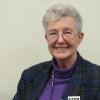GSR Today - Both gratitude and hope welled up within me as I saw photos and videos of the mass of people crossing the Edmund Pettus Bridge on Sunday in Selma. Gratitude for all those who have gone before us, paving the way: for their courage and willingness to lay down their lives. Hope in the coming together, in the youth and the road ahead.
Three Stats and a Map - Last week, the U.S. Department of Justice released the findings from its investigation of the police department in Ferguson, Missouri. Although the Justice Department did not find strong enough evidence to indict the officer who killed Michael Brown, they did find many problems with the Ferguson Police Department and the municipal court system.
January 30 marked the 100th anniversary of the birth of Thomas Merton, known simply as Father Louis to his brother Trappists, but to the world as a young intellectual who heard the voice of God and followed it into cloistered monastic life. His memoir The Seven Storey Mountain, published in 1948, became a best seller. A spiritual “shot heard round the world,” it is a conversion story still resonating with seekers in our fast-paced age. By this and numerous other works Merton fathered the contemplative living and prayer movements of our time.
From A Nun's Life podcasts - What does it mean to say that discernment is a way of life?
After raising three sons and enjoying her profession as a school librarian, Hildegard became a contemplative Redemptoristine nun in 2000. Her community shares a monastery with Carmelite nuns in Beacon, New York. Her writings have been published in Review for Religious, Cistercian Studies Quarterly and the journal of her international order, the Order of the Most Holy Redeemer (OSsR). She blogs at Contemplative Horizon.
"The ice lace gives way to ice melt and the disappearance into nothingness?"
Sr. Chantal Desmarais lives a life of contrasts. The Canadian Sister of Charity of Saint Mary spends a lot of time in prayer and contemplation. She also spends a lot of time playing hockey in a Sunday-night women’s league in Boucherville, northeast of Montreal.
GSR Today - The Selma anniversary was an impetus for reflection on the last 50 years of race relations in the United States. Congressman and civil rights leader John Lewis took to Twitter to publically reflect. In The New York Times, veteran journalist Gay Talese wrote about what’s changed since he was in Selma to cover the original march. Here at Global Sisters Report, we’re reflecting, too.
We Catholic women and men religious at the U.N. consider ourselves “gadflies” who remind the U.N. delegates to be faithful to the post-world war United Nations Charter, which was based on peace, justice and human rights. Our particular NGO (non-governmental organization), UNANIMA International, is a coalition of 19 different congregations of women religious – 20,000 of us, in over 80 countries. At the United Nations we join the representatives of over 100 Catholic congregations of men and women religious with a presence in more than 153 countries and hundreds of other faith-based NGOs from all over the world.
Michele Morek is an Ursuline Sister of Mount Saint Joseph, Kentucky. She worked for Global Sisters Report from January 2017 to July 2022 as liaison to women religious and organizations in North America. She holds a doctorate in biology from the University of Notre Dame and worked for many years as a professor and administrator at the college/university level. She also served for 14 years in congregational leadership positions, including six years as community leader.





